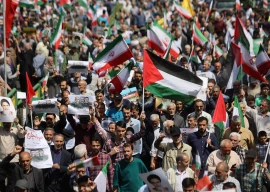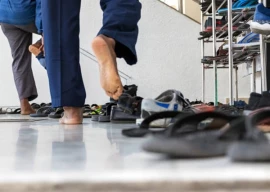
KARACHI: History puts today into perspective. In 1934, the British decided that factories would be fined Rs500 for breaking the rules. In those days that was a stupendous amount. Gold was cheap then at just Rs20 per tola. In 78 years since, the price of gold has gone up to Rs50,000 per tola - but factory fines remain at the same 1934 levels: Rs500.
Justice (retired) Qurban Alvi provided this nugget of history on Wednesday during the second hearing of the tribunal into the Baldia factory fire in which 258 people perished.
Labour officials had just told the judge that they were still working with the factory rules of 1934 and could only fine an owner Rs500 to Rs1,000.
“We are toothless,” said Owais Ahmed Shaikh, who is a technical deputy director with the labour department. “We cannot even force factory employers to pay the penalty and have to go to a judicial magistrate to enforce our decision.”
It appears that the Sindh Industrial Trading Estate (SITE), where the ill-fated Baldia factory is located, doesn’t have much more power either.
If a factory breaks the rules, SITE just fines them but can’t force them to undo the damage, explained SITE MD, Rashid Solangi. So, for example, if a factory doesn’t follow the rule of leaving 20% of space vacant in the building, all they have to do is pay the fine.
“We just impose a fine and regularise the faulty construction, because we have no authority to raze the buildings and take action against the factories,” said Solangi.
SITE’s job is to allot plots on 99-year leases and develop infrastructure. It has nothing to do with fire and safety equipment, Solangi said.
After factory owners receive their plot allotments they draw up proposals for their buildings in consultation with the civil defence and labour departments.
Even fire exits are not SITE’s responsibility, the MD said. “The labour department and building control authority have to keep vigil on that,” he said. “SITE [works as a] landlord and charges annual rent and development charges.”
As it turns out, even if SITE and the labour department had more powers, they don’t have the staff to cope.
SITE alone has 2,400 factories. According to the labour department’s Shaikh, Karachi has more than 10,000 factories but there are only five health and safety officers with the labour department.
“How is it possible for us to monitor all factories in Pakistan’s largest economic hub,” he said. The posts of deputy directors exist but no one has been appointed to them.
Ali Enterprise not registered
A joint director with the labour department, Gulzar Shaikh, told the tribunal that Ali Enterprises that ran the Baldia garment factory, was not registered with them.
“How can we take action until or unless we receive complaints against any factory,” he said in answer to questions.
When a member of the tribunal, Khalil Ahmed, asked about Ali Enterprises, which according to him had been working for years, the labour official replied that they had no idea about it until the fire broke out.
Too many cooks
Justice (retired) Qurban Alvi pointed out that forming multiple committees to investigate the fire would create a “mess”.
The provincial government has been asked to stop all inquires until the tribunal is able to record the statements of witnesses and prepare its report. The building also needed to be surveyed.
“Everyone is just firing blanks,” Alvi said while talking to journalists at his office. He was referring to the statements being made by the police, officials of the district government of Karachi, the FIA and other departments.
“No one knows what has happened. We need a comprehensive inquiry.” The tribunal has to submit its report by Friday.
“We have to record the statements of forensic experts, eyewitnesses and experts from Gul Ahmed Textile Mill, where ideal arrangements have been made for the safety of workers,” he said, adding that the tribunal would also look into how chemicals were being used in garment factories.
Published in The Express Tribune, September 20th, 2012.
COMMENTS (8)
Comments are moderated and generally will be posted if they are on-topic and not abusive.
For more information, please see our Comments FAQ


































































Shabash govt of pakistan for delivering such a brutal decision of course with the help of judiciary system,must be a very proud day for department of justice and the politicians.............
Khurram, is there something we can help with (financially) for the families of the victims. Please let us know.
If the fine was originally based on gold, and they were meant to pay 25 tola (500r/20), then it should be the same now, just taking into account the rising price per tola, rs. 750,000. Even that seems to low tho for industry moguls who don't care about human lives. they should weigh the dirt that has to be removed to make 300+ graves and pay that back in gold to each victim's family!
Ohhhh.. Amazing!!!! Bravo!!! Now factory owners will think twice before violating safety norms!!!
Ohhhh... Amazing!!!! Bravo!!!
This will definitely deter factory owners from violating safety norms!!!
Now that is the actual job of MPAs and MNAs: to revise and review laws!!! Their job is NOT to make roads and bridges.